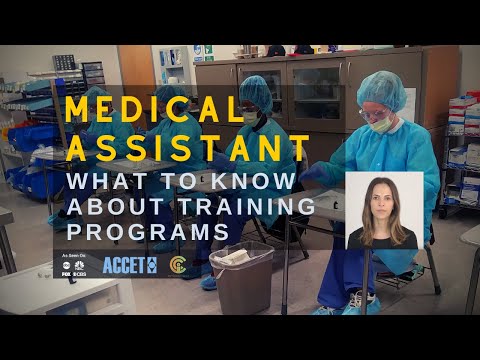Interviewer Tips: Medical Assistant Interview Questions
Contents [show]
If you’re interviewing for a medical assistant position, you’ll want to be prepared for questions about your experience, skills, and qualifications. In this blog post, we’ll share some of the most common medical assistant interview questions, so you can go into your interview with confidence.
Checkout this video:
Introduction: what to expect in a medical assistant interview
As a medical assistant you will be responsible for a variety of tasks in the medical office, including patient care, clerical work, and record keeping. Because of the nature of the job, employers want to be sure that they are hiring responsible and compassionate individuals who have the skills necessary to perform the job.
During your interview, the employer will ask you both general and specific questions about your qualifications and your experience in order to get a better sense of who you are and whether or not you would be a good fit for the position. Here are some tips on how to prepare for your medical assistant interview, as well as some sample questions that you may be asked.
Preparing for Your Interview
Before your interview, it is important to take some time to reflect on your qualifications and experience. Think about why you want to be a medical assistant and what qualities you have that make you suited for the job. It is also helpful to research the company or medical practice ahead of time so that you can ask informed questions about the organization during your interview.
In addition to preparing mentally for your interview, it is also important to take some time to gather any documents that you may need, such as copies of your resume or transcripts. You should also dress professionally for your interview and arrive on time.
Sample Interview Questions
During your medical assistant interview, the employer will ask questions about both your qualifications and your experience. Here are some sample questions that you may be asked:
-What qualities do you think are important in a successful medical assistant?
-What experience do you have working with patients?
-How would you handle a situation where a patient was angry or upset?
-What do you think are the most important responsibilities of a medical assistant?
-Do you have any experience with electronic health records?
-How would you handle a situation where there was a conflict between two staff members?
-What do we need to know about your availability?
The basics: questions about your experience and qualifications
One of the most important aspects of preparing for a medical assistant interview is knowing what questions you may be asked about your experience and qualifications. This will help you to be able to provide the interviewer with specific examples of your skills and abilities, and give you the opportunity to highlight your strengths. Here are some sample medical assistant interview questions that you may be asked:
-What experience do you have working as a medical assistant?
-Where did you train to be a medical assistant?
-What do you think are the most important qualities for a successful medical assistant?
-What qualifications do you have that make you a good fit for this job?
-Tell me about a time when you had to deal with a difficult patient or situation.
-How do you handle stress while working?
-What do you think are the biggest challenges facing Medical assistants today?
The nitty-gritty: questions about your day-to-day responsibilities
As a medical assistant, you’ll wear many hats. One day you might be taking patient vital signs, and the next day you might be administering injections or performing EKGs. Your interviewer will want to know that you’re comfortable with the range of responsibilities expected of Medical Assistants so be prepared to talk about your experience with various medical procedures.
Some specific medical assistant interview questions you might be asked include:
– Can you describe a typical day in your current role?
– What are some of the tasks you perform on a daily basis?
– Have you had experience taking patient vital signs? Can you tell me about that?
– What is your experience with administering injections?
– Have you ever performed an EKG? Can you walk me through the steps involved?
The big picture: questions about your long-term goals
It’s not uncommon for interviewers to ask medical assistant candidates about their long-term goals. Hiring managers want to make sure that you’re looking for a career in medical assisting and not just a job to tide you over until something else comes along.
When an interviewer asks about your long-term goals, they’re usually looking for two things:
1.they want to know if you see yourself in a medical assistant role for the foreseeable future, and
2.they want to get a sense of how well you might fit into their organization.
To answer these questions effectively, you’ll need to do two things:
1.Paint a picture of yourself in a medical assistant role several years down the road, and
2.Explain how the organization you’re interviewing with can help you reach your long-term goals.
For example, you might say something like this: “In five years, I see myself working as a lead medical assistant in a large primary care practice. I’m very organized and have a natural ability to take charge, so I think I would excel in a lead role. I’m also interested in pursuing additional certifications down the road, and I know your organization offers tuition assistance for continuing education.”
The tough stuff: questions about challenges you’ve faced
You may be asked about a time you’ve had to deal with a difficult customer or coworker. The interviewer wants to know how you handle difficult situations, and whether you’re able to stay calm under pressure. Be honest about the challenges you’ve faced, and give specific examples of how you coped with them.
You might also be asked what you do when you’re feeling stressed. This is another opportunity to show that you’re able to stay calm under pressure. Again, be honest and give specific examples of how you deal with stress.
Finally, you may be asked about a time when you made a mistake at work. Everyone makes mistakes sometimes, but it’s important to show that you’re able to admit when you’ve made one and learn from it. Talk about a specific mistake that you made, and what you did to fix it and prevent it from happening again in the future.
The fun stuff: questions about your favorite aspects of the job
Questions about your favorite aspects of the job
What do you like best about working as a medical assistant?
What’s your favorite thing to do in a typical workday?
What do you think makes this job different from other medical assisting jobs?
Do you have any experience with electronic health records? If so, tell me about it.
The personal stuff: questions about your motivation and values
What made you choose medical assisting as a career?
How has your education and experience prepared you for this role?
What do you think are the most important qualities for a successful medical assistant?
What do you think sets your skills and abilities apart from other candidates?
What are your long-term career aspirations as a medical assistant?
What do you think are the biggest challenges facing medical assistants today?
The curveballs: unexpected questions that catch you off guard
You aced the medical assistant interview questions they asked about your experience and qualifications, but then the interviewer threw you a curveball. Unexpected questions can catch you off guard and throw you off your game if you’re not prepared for them. Here are some tips on how to answer some of the most common curveball questions:
-What would you do if a patient became agitated?
-How would you deal with a difficult co-worker?
-What would you do if you witnessed a colleague stealing supplies from work?
-What are some of the challenges you anticipate in this role?
The key to answering these curveball questions is to stay calm and focused, and to be honest in your response. Don’t try to make up an answer on the spot – instead, take a moment to collect your thoughts before responding. And remember, there’s no wrong answer – the interviewer just wants to see how you react under pressure and whether you have the presence of mind to think on your feet.
The wrap-up: how to end the interview on a strong note
Ending the interview is often just as important as starting it. This is your chance to make a lasting impression on the interviewer and leave them with a positive image of you. Here are some tips on how to end an interview on a strong note:
-Thank the interviewer for their time and express your interest in the position.
-Review your qualifications and reiterate why you would be the best candidate for the job.
-Ask about next steps in the hiring process.
-Offer to answer any remaining questions.
Resources and next steps: where to go for more information
As you prepare for your upcoming medical assistant interview, it’s important to familiarize yourself with the types of questions that may be asked. To help you get started, we’ve compiled a list of commonly asked medical assistant interview questions, along with sample answers to help you prepare.
Before your interview, take some time to review these questions and think about how you would answer each one. Being prepared will help you feel more confident and allow you to focus on making a good impression during your interview.
What are your greatest strengths?
My greatest strength is my ability to remain calm and focused in chaotic or stressful situations. I’m able to keep a clear head and handle whatever comes my way, which is an important trait in a medical assistant.
What are your greatest weaknesses?
I tend to be a perfectionist, which can sometimes lead to me being overly critical of myself. I’m working on learning to let go and not be so hard on myself when things don’t go perfectly.
Why did you choose to pursue a career in medical assisting?
I was drawn to the medical field because I have a strong interest in helping people and making a difference in their lives. I chose medical assisting because it provides me with the opportunity to do both of those things on a daily basis.







